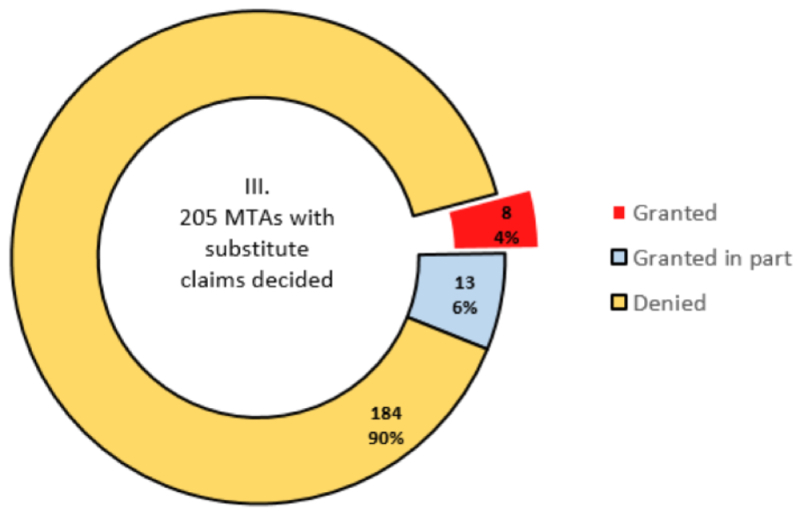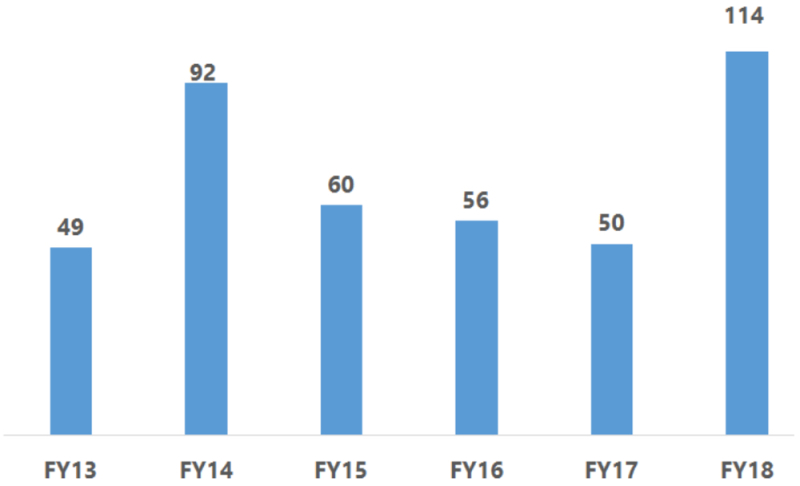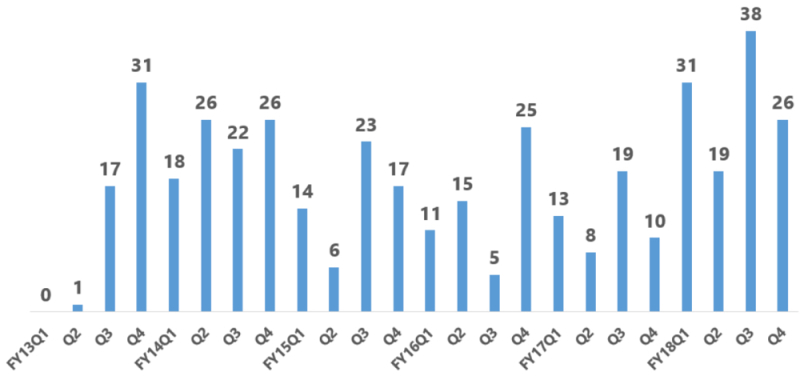
On March 13, 2019, the U.S. Patent and Trademark Office's Patent Trial and Appeal Board announced that it had updated its Motion to Amend Study to include all trials under the post-grant review proceedings enacted in the Leahy-Smith America Invents Act (AIA) through the end of Fiscal Year 2017 (which ended on September 30, 2018). The original study included data through April 30, 2016. At that time, only two motions to amend had been granted outright, with another four granted-in-part. This study was updated last year with data through May 31, 2017. At that time, two additional motions to amend had been granted outright, with an additional four granted-in-part. The last study included no new motions to amend granted outright, but there were two more that have been granted-in-part. At the date of the last study release (January 12, 2018), a total of fourteen motions to amend had been granted at least in part as of September 30, 2017 (out of a total of 275 completed trials in which a motion to amend was filed). The Office has also released tabulated data on all 326 completed trials.
The current study reports that there have been a total of 4,269 trials (post-grant review, inter partes review, and covered business method patent reviews) in which Motions to Amend under 35 U.S.C. § 316(d) (8%) have been filed. In those trials, 6% were granted as being directed to cancelling claims, and 11% have been mooted by PTAB decision that the original claims were patentable. In 20% of these cases, the parties settled, requested adverse judgment, or the proceedings were dismissed, leaving 205 trials (63%) where the motions to amend were decided by the PTAB. The study also notes that motions to amend have been filed in 90 of the 670 pending trials (13%).
At this juncture the statistics become less encouraging:

90% of these motions were denied, and in another 6% they were denied in part. Most of the grounds for denying the motions were statutory (89%); the vast majority of these (45%) were denied under § 102 and/or § 103, but about 20% were denied on other statutory grounds (§ 101 and § 112) and almost in almost 30% of the decisions the Board had multiple grounds for denying the motion.
Not surprisingly, the number of trials having motions to amend had increased after the Federal Circuit rendered its decision in Aqua Products, Inc. v. Matal the number of trials having motions to amend had increased (keeping in mind that the Aqua Products decision was handed down on October 4, 2017, just after the close of the 2017 Fiscal Year):

(with the relatively high number of motions filed in FY2014 no doubt reflecting the naive belief that they were intended to be given fair consideration under § 318(d) of the AIA). The historical record presented in quarters makes the trend (and the effect of Aqua Products) even more pronounced:

Still, the frequency with which the Board has granted motions to amend, even after Aqua Products, is low and much lower than should be expected in view of the statutory language that provides for them:
(d) Amendment of the Patent.—
(1) In general.—During an inter partes review instituted under this chapter, the patent owner may file 1 motion to amend the patent in 1 or more of the following ways:
(A) Cancel any challenged patent claim.
(B) For each challenged claim, propose a reasonable number of substitute claims.
(2) Additional motions.—
Additional motions to amend may be permitted upon the joint request of the petitioner and the patent owner to materially advance the settlement of a proceeding under section 317, or as permitted by regulations prescribed by the Director.
(3) Scope of claims.—
An amendment under this subsection may not enlarge the scope of the claims of the patent or introduce new matter.
This language is at least permissive and there is reason to believe Congress intended these post-grant review proceedings to be remedial in nature, permitting both petitioners and patent owners to correct improvidently granted patents and cabin claims to their proper scope. That of course has not happened, in large part because the Office has prioritized the statutory mandate of resolving these proceedings within twelve months of their institution. The Office has taken the position that this timeframe does not permit the type of examination scrutiny that would permit large scale "motion to amend" practice. As a result, a provision intended to protect patentee's rights by not letting linger proceedings that throw into question a patents validity (and thus value to investors, etc.) has become but one feature of a regime that invalidates questionably large portions of the patents subjected to it. (After all, it should be surprising to all by the most anti-patent zealots that the Office seems to do such a poor job of patent examination.) And it is equally surprising that patent owners subjected to AIA's palette of post-grant review proceedings don't seem to be able to craft an amended claim that satisfies the statutory provisions (or said another way, that can so easily be thwarted by petitioners, who bear the burden of showing the amended claims to be unpatentable), particularly with the knowledge of the prior art adduced by petitioners and their success at having the PTAB institute the proceedings in the first place.
The trend of motion to amend filings is encouraging (taking a silver-lining approach) but until the statistics show patent owners have a reasonable opportunity to have their amendments entered (and obtaining valid claims albeit of limited scope), studies like this one just show how far the AIA post-grant review regime still needs to go to achieve outcomes fair to petitioners, patent owners, and the public.